I suppose I don’t really know what the dog days of summer are, but whatever they are, I think we’re in ‘em. It’s hot here, stifling, at times, and I’m tired. That’s not uncommon but, like many of you, I bet, I fell asleep a few pages into reading a brand new book last night. My head snapped up as it does but I couldn’t get my reading groove back on. I gathered up Beth and we watched some TV.
Which reminds me that this regular feeling of being exhausted from work and worry about the world is nearly second nature to me, even if it isn’t the formation I’ve longed for. As so many good authors have told us, there are disciplines and practices we can take up to train ourselves towards greater openness to God. Habits of the heart which might yield greater health and wholeness and maybe even energy. Maybe the summertime schedule — dog days or not — can create a thin space for you to hear God speak somehow. Maybe these books can help.
For starters, before I share about four important new spiritual formation books (two not even out yet, two just out this week) I want to name in passing three rather special books about sane Christian growth. At the very least, you should know this kind of stuff. Some “self-help” books are actually incredibly profound, relating spiritual formation themes to our ordinary lives. Do you recall my rave announcement a month ago of The Good and Beautiful You: Discovering the Person Jesus Created You to Be by James Bryan Smith? What a good example of putting pretty profound insights about the interior life of spirituality into the realm of daily life and self care!
Here are just a few more.
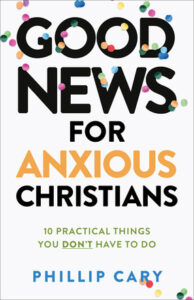 Good News for Anxious Christians: 10 Practical Things You Don’t Have to Do Phillip Cary (Brazos) $21.99 OUR SALE PRICE = $17.5
Good News for Anxious Christians: 10 Practical Things You Don’t Have to Do Phillip Cary (Brazos) $21.99 OUR SALE PRICE = $17.5
This has been re-issued with a slightly expanded format, sporting a new cover and a thoughtful new afterword. And (surprise) there’s a blurb by me on the back where I said (in our BookNotes review back when the first edition came out) “Tremendously rich and thoughtful and wonderfully written…This is solid pastoral theology, inviting deeper and more mature thinking about the slogans and cliches we hear to often.” That is, it’s thoughtful and solid and ecumenical and — get this! — in light of the very truths of the gospel, we are set free from a lot of stuff we are encouraged to do; discipleship is a gradual long-term process as we experience the gospel in Christian community.
Each chapter is a thing we don’t have to do such as “You Don’t Have to Hear God’s Voice in Your Heart” or “You don’t have to Let God Take Control” or “You Don’t have to Keep Getting Transformed All the Time.” I liked the one called “Why Applying it to Your Life is Boring.” So there.
I should note that this isn’t for those with anxiety disorders and doesn’t particularly address the fears and foibles of mental health issues. It wouldn’t be bad for those with that kind of anxiety, but in the title, here, it is more about those anxious about their faith, those fretting about their sin or Christian living, about those poised to buy yet another book which offers the formula for successful Kingdom living. Skip all of those. This rejects techniques and disapproves of simple, practical sermons-lite, inviting, instead, a richer, fuller, entrance into the classic forms of faith in a mature congregation.
Such churches remind us of the gospel. Dr. Carey is the Scholar-in-Residence at the Templeton Honors College at Eastern University so this book is a bit demanding. But it is great.
How about this blurb by Andy Crouch:
Yes! No! Whoa! There are so many terrific, alarming, insightful zingers in this book that I agreed, disagreed and, most of all, had to think about something on every page. Graceful and liberating, this book is a word of wisdom and hope that just might convince anxious Christians that the gospel really is better news than we’ve yet imagined.”–Andy Crouch, author, The Life We’re Looking For
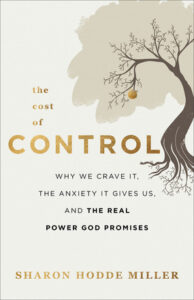 The Cost of Control: Why We Crave It, The Anxiety it Gives Us, and the Real Power God Promises Sharon Hodde Miller (Baker) $16.99 OUR SALE PRICE = $13.59
The Cost of Control: Why We Crave It, The Anxiety it Gives Us, and the Real Power God Promises Sharon Hodde Miller (Baker) $16.99 OUR SALE PRICE = $13.59
Sharon Hodde Miller is an easy to read and upbeat best seller but she has depth and a thoughtful approach. We are happy to suggest her brand new one. Yep, it sounds like one of these hip new voices insisting they know just exactly what we need to do to grow into Christlikeness, and freedom and health, but, trust me, she is a theologically aware and psychologically sane author, inviting us to loosen the grip of control —or, as Rich Villodas puts in his good back-cover endorsement, “to be freed from the grip of the illusion control.”
Our self-help fascination and basic Christian growth industry is too often based on this very illusion, that we can be in control. As Miller shows, “The problem is, the more we seek the illusion of control, the more it betrays us. In place of certainty, it gives us anxiety. In place of predictability, it creates complexity. And in place of unity, it divides. It’s not just that we cannot control things, it is that we break them even more when we try.”
Hodde Miller is a fresh, upbeat voice but we respect her a lot. She’s got a MDiv from Duke and a PhD from Trinity Evangelical Divinity School. She is the teaching pastor at Bright City Church in Durham, NC.
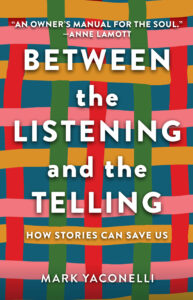 Between the Listening and the Telling: How Stories Can Save Us Mark Yaconelli (Broadleaf) $24.99 OUR SALE PRICE = $19.99
Between the Listening and the Telling: How Stories Can Save Us Mark Yaconelli (Broadleaf) $24.99 OUR SALE PRICE = $19.99
I suppose this deserves a bigger review than I can muster now, but I really want you to know about the eagerly awaited new book by Mark Yaconelli which emerges from his work with The Hearth Community project. I’m excited about the book and glad he’s on Broadleaf.
Broadleaf is a theologically astute— if often quite progressive —mainline denominational press that does a variety of books, but many that might be considered self-help or personal growth or about interpersonal relations. Given their spiritual orientation and justice-sensitive framework, even their psychology books are deeply interwoven with sensible pastoral insights and often are written by those passionate about a Christian life that makes a difference in the world.
Many of our customers appreciate their edgy, mystical-but-practical books like How Not to Be Afraid by Gareth Higgins (Broadleaf; $24.99) or The Lightmaker’s Manifesto: How to Work for Change without Losing Your Joy by Karen Warlord (Broadleaf; $26.99) that comes with rave blurbs from Romal Tun and Austin Channing Brown (and, for that matter, her colleague Brene Brown.) I’ve promoted their lovely The Sacred Pulse: Holy Rhythms for Overwhelmed Souls by April Fiet (with a forward by Chuck DeGroat) which is a gem of a little book.
This new hardback by storyteller Mark Yaconelli may be the best of their batch this season.
Yaconelli’s last book was the very special IVP title, published in 2016 and one we wouldn’t want to be out of, The Gift of Hard Things: Finding Grace in Unexpected Places (IVP; $16.00.) It showed him to be a good listener and a great storyteller. This new one is simply spectacular. As Anne Lamott says in her enthusiastic (and storytelling) foreword, “We need a teacher and a book such as this.” Yes, he and Anne are long friends and she has written about him before.
Although I had met his famous, funny dad, Mike, a time or two, I have not met Mark. But I love how Anne describes him as she starts of her forward:
Mark Yaconelli is an unusual person, as brilliant as he is plainspoken. He is an activist and a homebody, a contemplative and a goofball, gentle in spirit and charismatic, funny, deeply articulate, and capable of both wonderful compassion and silliness.
And, she says, with a sly grin, I am sure, “He brings all these qualities to his new book.” Of course he does!
This brand new release is full of stories but it is not merely a collection of his colorful and poignant anecdotes. That would be itself worth whatever it costs to plunk down, but this is even better. It is a study of the role of stories, showing how our stories are vital and how knowing them of each other — the speaking and the listening, the telling and the receiving — can help form bridges of understanding. As the epigram from Barry Lopez puts it, it’s really all we’ve got — stories and compassion.
As the publisher notes, ”stories tether unto what matters most: our families, our friends, our hearts, our planet, the wondrous mystery of life itself.”
Yet, Mark says, the stories we’ve been telling ourselves as a civilization are killing us: Fear is wisdom. Vanity is virtuous. Violence is peace. This book is perhaps too elegant to be called a “counter-narrative” but that’s what Brueggemann might call it. Others have called it “an enchanting meditation on the power of storytelling in our individual and our collective lives.”
This is an immersive, elegant meditation, an offering of grace. Mark Yaconelli ushers us into rooms full of authentic stories, where facades fall and suffering and joy are metabolized. — Kirsten Powers, CNN Senior Political Analyst and New York Times bestselling author of Saving Grace: Speak Your Truth, Stay Centered, and Learn to Coexist with People Who Drive You Nuts
FOUR BOOKS OF SPIRITUAL FORMATION
TWO AVAILABLE NOW, TWO COMING IN SEPTEMBER
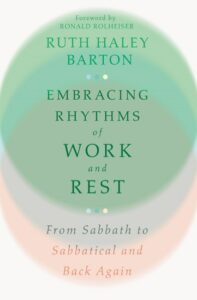 Embracing Rhythms of Work and Rest: From Sabbath to Sabbatical and Back Again Ruth Haley Barton (IVP) $25.00 OUR SALE PRICE = $20.00
Embracing Rhythms of Work and Rest: From Sabbath to Sabbatical and Back Again Ruth Haley Barton (IVP) $25.00 OUR SALE PRICE = $20.00
A week ago this book showed up, a bit early, as we were furiously packing our last-minute stuff to throw in the truck as we headed to our first face-to-face off-site thing since early 2020. When I announced it up front to our CCO friends, I quipped —seriously — that I knew nothing about it. At that point I hadn’t even opened the cover, but some of the campus ministry staff in the room knew Ruth and many respect her work. They chuckled to hear me so speechless. For those who know me well, though, they caught my real meaning: I really don’t know much about this topic, even though I can tell you almost every major book published on the topic in the last 20 years.
Ruth herself knows this about me and has, in her lovely way, reminded me on occasion that burn-out and spiritual dryness is a serious risk for those in faith leadership positions, and she supposes that includes small town booksellers like me and Beth. She is right; of course she is.
I’ve made some improvements from my most earnest workaholic days although the urgencies of our work (and our financial instability, to put it nicely) sometimes just means we’ve got to do the work at weird hours and 7 days a week. I don’t mean to presume on God’s good grace, but there you have it.
And so, as I pre-ordered this book a half year ago I have to admit — as much as I adore Ruth as a person and as a writer, so would read anything she wrote (yep, she is one of those in my book!)— that I was thinking of our jam-packed sabbath keeping section. We’ve got Rabbi Heschel’s immortal classic, Sabbath, of course, and the must-read Marva Dawn, Keeping the Sabbath Wholly: Ceasing, Resting, Embracing, Feasting. I often start people off with the excellent (and very nicely written) The Rest of God by Mark Buchanan. What a book! We still love Dorothy Bass’s eloquent Receiving the Day: Christian Practices for Opening the Gift of Time and continue to recommend (and even read from) small portions from the glorious Sabbath by Dan Allender who insists that sabbath is not just about rest, but about play — re-creation. Eugene Peterson liked Matthew Sleeth’s 24/6 and with the brand new Agrarian Spirit by Norman Wirzba, we should revisit his broad and sensible way of life suggested in Living the Sabbath: Discovering the Rhythms of Rest and Delight. And we have to list Walter Brueggemann’s Sabbath as Resistance. One of the most enduring and deeply spiritual volumes is simply called Sabbath: Finding Rest, Renewal, and Delight in Our Busy Lives by Wayne Mueller.
Yet, these days, if I am pressed to recommend just one, I’d say — for a heft study with lots of multi-dimensional, radical application — I’d suggest A.J. Swoboda’s Subversive Sabbath: The Surprising Power of Rest in a Nonstop World. Although, geesh, you really should read Marva Dawn! And that Rest of God is just so nice.
Which brings us to Ruth Haley Barton who is now on the top end of that list of acclaimed titles. Yes! She brings her lovely style, her honesty and candor, even sharing about her own discovery of the health of sabbath keeping practices even as she was resisting it. It is telling and a generous start to which busy leaders will be able to relate. As these other books mostly say, we live in a frenzied culture, and this stuff is important — in part because God has commanded it, but also because (let’s just be honest) our jam packed busyness is not virtue; our fast-paced hustle is part of the problem of our culture’s disease.
Ruth’s book says on the back, noting how elusive balanced rhythms of work and rest can be, that “this rings especially true for pastors and leaders who carry the weight of nonstop responsibility.” Most know they need rest, she observes, “but might be surprised to find within themselves a deep resistance to letting go and resting in God one day a week.”
There is reason that activist leaders like Brenda Salter McNeil (Becoming Brave) says this new book is “a prophetic wake up-call.” Black poet and East Village NY pastor Drew Jackson says it is a “must-read for anyone longing for freedom from the tyranny of endless work and overproduction.”
As I turned the pages slowly and pondered her meaning and my response, I felt invited into this journey without pressure or guilt. Or at least not much. My hat is off to Ruth for bringing some fresh words and passion and insights to this much-covered topic; she really is a very fine teacher and writer. If you know this topic well — even if you practice it well — I think you will love this book. If you are in need of a compelling call to do it (or not do it, as the case may be) this could be it. It offers hard-won wisdom.
There are three things that set this book apart from the others. And they are huge. She gets it right and, again, it makes Embracing Rhythms of Work and Rest, so valuable.
Firstly, it is about the goodness of rhythm. This is a key aspect of creational reality, seasons and such, and we humans need to play our part, respond faithfully to the reality of days and weeks, months and seasons. She roots this in good stories and solid Biblical reflection. It is common sense, but radical, if delightfully phrased. She entices us into this pretty counter-cultural view of the clock. It is about the rhythms of work and rest, not legalistic adherence to a rule.
Secondly, she invites us into common practices of sabbath and an ethos of sabbath-keeping in our faith communities. No other book is as candid about this and no other book could be as revolutionary for the churches — we are supposed to be doing this together. Or at least in tandem with others. Let’s face it — it is harder to avoid the frantic stuff of shopping and answering emails and being busy on Sunday if we realize few others in our own church or small group give a rip about these things. We feel like some mystic or lone Puritan, and it’s hard. What if our whole church felt called to this liberating way of a rhythm of life, honoring the invitation to sabbath joy. What if it oozed from our pastors andChristian educators and what if we somehow had these conversations at church? Ruth says all this in helpful ways and the book includes a conversation guide for small groups and communities.
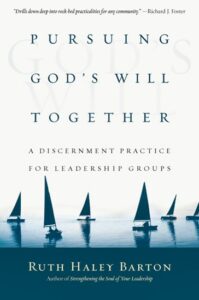
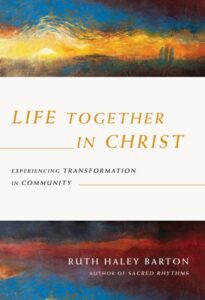 (She has long been good at this, writing a book on the spirituality of leadership for pastors and those in ministry, then wrote a book on spiritual formation practices for groups, to be explored together, and she has one spiritual discernment practices for faith communities and their leaders.)
(She has long been good at this, writing a book on the spirituality of leadership for pastors and those in ministry, then wrote a book on spiritual formation practices for groups, to be explored together, and she has one spiritual discernment practices for faith communities and their leaders.)
Thirdly — and this really makes this book both fascinating and vital. I hope we ordinary folk don’t avoid it because of this, but about a final third of it is about sabbatical. It is about pastoral replenishment and the need for extended periods of sabbatical time. I’m just reading this part now and I am finding it very convincing.
I’ll admit as somewhat of an egalitarian who is paid much less and works harder than many ministers I know, I’ve never had much sympathy for these long periods off that some pastors get. Some already get exuberant days and weeks off, not to mention study leave. Except for college profs, who else gets such special treatment? Nobody I know.
And yet, they should. I believe that. And this book makes it crystal clear and even maps out ways to do so (without turning into an Alban Institute-type manual.) The subtitle of Embracing… is important: From Sabbath to Sabbatical and Back Again.The book is a must for church leaders, but, truly, I think it is for all of us to understand this whole business (and perhaps advocate for your pastor if need be.)
Sabbath, she shows, is “more than a practice.” It’s a way of life ordered around “God’s invitation to regular rhythms of work, rest, and replenishment.” This means upending some of the way we think about work and wages, time and productivity. But she also is upbeat when she observes that well-rested and spiritually alive leaders are, in fact, better leaders, more fruitful and helpful than if they are exhausted and weary. Right!
In a way, this one is more foundational and perhaps more urgent for most of us, than her last one, but it now makes me want to read that one again, which I only skimmed. Now I want to read it carefully, savor it, maybe put some of it into practice. Like I said — I don’t really know that much about all this. Most of us, I suspect, are novices. Maybe you, too, might try her 2018 very lovely book, Invitation to Retreat: The Gift and Necessity of Time Away with God.
But, please, for your own sake and for the sake of our churches and our world who needs us all to be well, don’t miss Embracing Rhythms of Work and Rest: From Sabbath to Sabbatical and Back Again. We’ve got it now at 20% off.
I like the invitation of Fuller prof and leadership guru, Tod Bolsinger (author of Canoeing the Mountains and Tempered Resilience) who writes wisely:
“Take a deep breath, be prepared for all that will be stirred up, and then bask in the teaching of this profoundly beautiful book.”
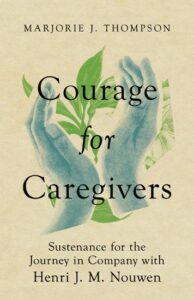 Courage for Caregivers: Sustenance for the Journey in Company with Henri J.M. Nouwen Marjorie J. Thompson (IVP) $20.00 OUR SALE PRICE = $16.00
Courage for Caregivers: Sustenance for the Journey in Company with Henri J.M. Nouwen Marjorie J. Thompson (IVP) $20.00 OUR SALE PRICE = $16.00
Marj Thompson has a new book! About Henri Nouwen! Stop the presses, friends, this is amazing new news and I am sure — whether you want to explore the gifts and challenges of caregiving or not — you will want this lovely new volume. Wow.
Marjorie Thompson gets credit for catapulting contemplative spirituality and a more monastic-type formational practice into the common experience of most church folks. She has served not only as a pastor and retreat leader in the PC(USA) but for a while directed spirituality stuff for the denomination. Her book Soul Feast: An Invitation to the Christian Spiritual Life (first released in 1995) is a true classic, a must have resource for both beginners in the deeper spiritual journey and for those well on their way. It even comes in a larger print edition, slightly oversized. That book has a forward by Henri Nouwen (and in the second, newer, expanded edition, also a piece by Barbara Brown Taylor.)
And here is what you may not know. One of Henri Nouwen’s best friends and sometimes-collaborator (from back in their Yale days) was John Mogabgab, who happens to be Marj Thompson’s husband. Which is to say, she knew Henri as a dear family friend, like, forever.
So what is this new book? It draws on the considerable writings and wisdom of Nouwen on the theme of caregiving. It is by Thompson but in each chapter — replete with stories of those giving care and those who are elderly or in hospice and the like — she draws on insights learned from Henri or his books. Ends up that she and John have done this kind of work for quite some time, starting with the era when they were close to Henri (who was writing much about pastoral care and the spirituality of compassion.) There is much more of Thompson than of Nouwen here, so the subtitle is just right: this offers spiritual sustenance for the journey of caregiving in the company of Henri Nouwen.
(Forgive my aside, but it seems good to note right about here: Flying Falling Catching: An Unlikely Story of Finding Freedom is a recent biography of the years Henri joined the trapeze troupe, the Flying Roudleighs, which draws considerably on the final, unfinished manuscript Henri was working on when died. It is his “exhilarating true story of friendship and community and the Flying Trapeze.” You learn of his own woundedness and inner anguish and how his lifelong search for wholeness brings what author Lisa Napoli calls “a beautiful, moving story about interconnectivity, interdependence, and life’s rich, beautiful, complicated pageant.”)
Two more things about Courage for Caregivers: Scott Morris, the extraordinary Christian doctor and health ministry advocate from urban Memphis has a hand in this and wrote a brief preface. His nonprofit, Church Health, has long drawn from Nouwen in their gentle caregiving for the poor and this makes the book that much more lovely.
Secondly, while the first 100 pages are beautiful and worthy, there is an extensive leader’s guide and conversation resource making this ideal for training those doing caregiving type work, or deacons or Stephen’s Ministers or others hoping to hold the sacred stories of the hurting. There is even an appendix for a “retreat leader” that would use the book at an event. 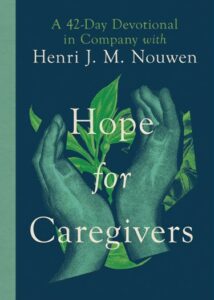 Further, there is a compendium of stories in the back and another with liturgical resources, stuff for congregations, and a several page biota guidance for congregations wanting to support caregivers. This is a great and useful resource.
Further, there is a compendium of stories in the back and another with liturgical resources, stuff for congregations, and a several page biota guidance for congregations wanting to support caregivers. This is a great and useful resource.
There will be another IVP book coming soon, Hope for Caregivers: A 42-Day Devotional in Company with Henri J. M. Nouwen which you could pre-order as it is coming soon! $16.00 OUR SALE PRICE = $12.80.
It is a stand-alone devotional, of course, but would make a very sweet companion volume to the Thompson book.
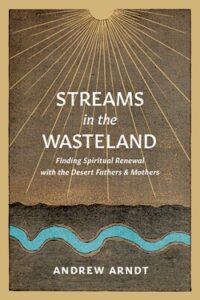 Streams in the Wasteland: Finding Spiritual Renewal with the Desert Fathers & Mothers Andrew Arndt (NavPress) $16.99 OUR SALE PRICE = $13.59
Streams in the Wasteland: Finding Spiritual Renewal with the Desert Fathers & Mothers Andrew Arndt (NavPress) $16.99 OUR SALE PRICE = $13.59
RELEASE DATE – SEPTEMBER 13, 2020 PRE-ORDER NOW.
Well, what can I say about this stellar book — due out in September, now, they say — that both invites us into the lives of the early desert Mothers and Fathers and shows that they are exceedingly relevant to today’s world? I need to do a longer review later, but for now, I want to rave about this briefly, highlighting three simple reasons you should order this now.
First, I’ll get it out of my system — you may not know much about this debate or may not care, but indulge me, please. Others have attempted to divest me of my bad attitude about the desert fathers and mothers, have tried to suggest they have much to offer, but my views have hardly changed much from the days when I said dear Henri Nouwen’s study of these early Egyptian mystics, The Way of the Heart, had more harm than help in it. To put it too simply, I thought — and still do, in some ways — that the desert saints were irresponsible to leave their places of life and worship to seek some early monastic experiences (monasteries as we think of them today were not quite invented yet.) I do not know of any serious Biblical warrant for this escapism, so I have said many a bad word about these Abbas. Further, I feared — and still do — that they were breathing the spirit of the intellectual air of those days which was essentially Gnostic or, at least, dualistic. They thought somehow God cared more about so-called spiritual things — the way of the heart — more than voting or taking out the garbage, play or work or making art. That may be what the pagan Greeks thought and it may be (ahem!) what many church leaders presumed in those days. They rejected the cultural mandate of Genesis 1 and 2 and assumed that the Christian religion was internal, private, and spiritual. It got the church off on the wrong foot and we’ve never fully recovered.
Okay, so I take some of it back. I’ve read parts of many books on these early monks who did miracles and taught prayer and love — one can hardly argue with that! — but none have convinced me that they were mostly right in their pilgrimage to the caves of the desert or that their worldview was sensible, let alone admirable. Until now. Streams in the Wasteland seems to me to be a book like none other and I appreciate that Andrew Arndt explains these fourth century men and women and their vibrant witness against the dominant religion of the Roman Empire.
Arndt avoids the deeper questions of whether these guys were really right in abandoning their churches and lives in the cities and towns from which they fled, and he avoids the question of whether any of us should really do that now. Who cares, really (my mind is pretty much made up about that) since this isn’t an academic book, and certainly is not an ideologically frantic and fearful sort of thing like Rod Dreher’s overblown Benedict Option. This just isn’t that kind of book.
Here is what he does do that is so very appealing. He shows how the simple truths (mostly about love) that inflamed these weirdos in the desert can be lived out in our own contemporary lives. He talks about the injustices of racism and he talks about work — it’s a very good chapter, too. Who knew these desert gurus had it in ‘em? Their insight is fresh and relevant and nearly explosive. I am pondering this book, applying some of its simply truths to my own soul. I’m not sure if Arndt is fully adequate in explaining the creation-regained reality of a full-orbed Christian life in and for the world, but he comes close. As some of the Abbas taught directly, we are to be about the Kingdom of God. The methods of what we have to do to prepare ourselves for the outward journey may vary, but, for now, it sure seems they have a lot to say.
For what it’s worth, a few major books were written in the late 300s about these dudes. John Arndt of Colorado Springs draws a lot on John Cassian of France, whose own work finally was sorted and sifted into two books, Institutes and Conferences. By the way, as John explains, the monastery in Marseilles that Cassian later founded, emerging from his own interviews with the desert folks, became the template, so to speak, for Benedict of Nursia “whose famous ‘Rule of Saint Benedict’ still influences Benedictine, Cistercian, and Trappist monks to this day.” As Ardnt says, “Cassian’s careful distillation of the spirituality of the desert lives on.”
Okay, so he shows how lasting and how relevant and even lively this stuff is. It’s moving and clear and fun. I’m still not a fan of some of the tedious parables the desert fathers told, but I get it. They were profound men and women, some of few words, and their witness led many to deeper, real righteousness. And it can be tapped today.
Streams in the Wasteland does just that as Arndt weaves into his narrative wonderful stories of his days growing up in a small-town, earnest, Pentecostal church in rural Wisconsin. He tells about people he knew, good people, those willing to be a bit odd for God — “peculiar people” as the KJV puts it. I was not raised in anything like that subculture but in a way it resonated. Or maybe I am projecting backward, wishing that I knew people with the deep kind of Godly love and power he saw graciously enacted as a child. Not sure why, but I was very deeply moved by his good storytelling, and longed for mentors and leaders like the kind he tells about — some from his youth, some from more recent congregations who have lived and struggled and served together.
You see, Streams in the Wasteland shows how the spiritual renewal of these radical Godly oddballs might speak to our own wasteland. He isn’t ideological or pushy, but in earnest, vivid, language and a few powerful stories, he shows that, indeed, many of us are beyond a boring faith or tired of right wing shenanigans — the problem is deeper than that. Our secularizing culture’s cross pressures are part of it (sure, he’s read Charles Taylor, or at least James Smith on Charles Taylor and is a thoughtful cultural critic) but as a pastor, he knows that people are longing for a real faith, an encounter with God, an experience of the Divine that isn’t sensationalized.
Before Part One of the book is a great graphic announcing this Part One, “Into the Desert with God” which is explained like this:
Here we begin to explore the call to the wilderness: the spiritual horizon that guides our quest; the renunciation of the heart that makes it possible; and the practices that work the life of the Kingdom into us.
Yes, there is a wild chapter called “The Great Renunciation” but it is followed by a sensible chapter showing the “essential habits for the with-God life.”
The second major portion offers another graphic and the announcement of the section “Into the Desert with Others.” Oh my, these chapters are rich, full of ancient wisdom for modern churches. The chapter titles are plain enough and belie their profundity — “Called into Community”, “Saved into Community” and “Restored through Community.” The mothers and fathers, as they are called, of the fourth century “great renunciation” aren’t the first or only ones to teach us about community, but Arndt draws on their radical teaching and brings it into today.
Here he names the local church as “the essential context” of the holy life — “No genuine Christian spirituality grows up without it.” I am not sure if it is an Abba or Abbas that called this rebuke of self-directed spirituality “a discovery of the redemptive mystery God enfleshes in the church” but it sure is a good line, eh?
Part Three is “Into the Desert for the world.” These chapters are called “Saving Speech” ( a topic the desert deserters had much to say, ironically), “Sanctifying Work” and “Divine Generosity.” That doesn’t sound weird, does it? Maybe even important for you? I’d say so.
Here are the nice words on the graphic page setting apart Part Three:
A life rooted and ordered to God in Christ brings blessing to the world: our patterns of speech change, our work is sanctified, our lives become gifts given for the life of the world — living miracles that bear witness to the Kingdom.
Like Andrew Arndt’s previous book on the Holy Trinity — All Flame: Entering into the Life of the Father, Son, and Holy Spirit — he draws on rich sources of old and contemporary writers. Naturally he uses Merton’s book on the sayings of the desert mystics; he uses Nouwen. Significantly, he tells how moving Benedicta Ward’s The Saying of the Desert Fathers: The Alphabetical Collection was for him. He cites Mennonite scholar Alan Kreider (The Patient Ferment of the Early Church) and Alexander Schmemann (For the Life of the World) and modern authors from Wendell Berry to Eugene Peterson to Ronald Rolheiser. I like that he brings in his New Life Church colleagues like Glen Packiam’s lovely Blessed, Broken, Given and Daniel Grothe’s important Power of Place. But most of the lengthy bibliography comes from citations of these old sayings and stories of the men and women of the late fourth century. Living in caves in the desert. Arndt has managed to bring what for me is the first convincing book about the wisdom of these “fathers and mothers” and how they might help us be more formed in the ways of King Jesus, even a way that might be considered human, humane, and beautiful. Wow — I recommend it.
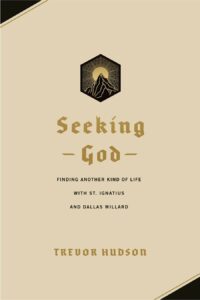 Seeking God: Finding Another Kind of Life with St. Ignatius and Dallas Willard Trevor Hudson (NavPress) $16.99 OUR SALE PRICE = $13.59
Seeking God: Finding Another Kind of Life with St. Ignatius and Dallas Willard Trevor Hudson (NavPress) $16.99 OUR SALE PRICE = $13.59
RELEASE DATE – SEPTEMBER 13, 2020 PRE-ORDER NOW
We are happy to get to announce this book — I’ve been carrying around an advance reader’s copy and wondering how to explain how good and rich and interesting it is. (Even if I hate the heavy metal font on the cover and headlines.)
For starters, we can say at least this: there is nothing like it in print. It really is, as the subtitle promises, an invitation to “find another way of life” and it does so by drawing on the ancient wisdom St. Ignatius of the early to mid 1500s and — get this! — the work of the late Dallas Willard who grew in fame at the end of the 20th century and was still alive and teaching just a decade ago. Ignatius was a Catholic reformer and spiritual teacher; Willard was a reasonable philosopher, student of human knowing, and quiet Protestant mystic. (He almost single-handedly convinced Richard Foster to write Celebration of Discipline, having mentored him a bit into the spiritual classics.)
Whether you know much about the famous”Ignatian method” of discerning God’s presence each day (and, throughout the day) or not, no matter. Whether you are drawn to the practical questions of Willard about how people change as they live in the Kingdom and what the renovation of the heart looks like, no matter. This little book brings them into conversation, so to speak, and it is illuminating, for sure.
Further — as if bringing these two giants into comparison, and learning a bit about what each taught as an approach to a life of lived, experiential, spiritual formation wasn’t enough to sell you on this book — the author himself is a notable leader (some might say a master) of the things about which he is writing. Hudson is a United Methodist pastor from South Africa. As a white ally of the anti-apartheid movement, he is known for clear-headed and outspoken prophetic gestures. But he doesn’t wear that on his sleeve and many may not realize his fairly simple books — like one on the Serenity Prayer, another the Holy Spirit and short devotionals such as Pause for Advent and Pauses for Lent — are deeply rooted in the inner life stuff of the monks and mystics and of modern day folk like Willard.
Hudson starts the book with the often-heard pastoral comments that people aren’t getting much from church or they wonder if “this is all there is” and the like, hinting, with hardly the vocabulary to say it, that they hunger for a holy encounter with God, a deeper sort of discipleship. This book, he says, is for those who are seeking. In fact, that is the first chapter’s topic — why we should seek, what makes one a true seeker? In our seeking we will discover others who sought after the things of God. In Seeking God Hudson tells about Ignatius of Loyola and Dallas Willard of California, two seekers of God.
This book is not a workbook, but it will appeal to those who like to process stuff. There are countless “seeking God exercises” with Bible scriptures to ponder and questions to consider, prayers are given and there is stuff to do. This is as it should be as anybody familiar with Ignition spirituality would know.
Willard suggested to Hudson once that he should “guard his mind” and this becomes a powerful part of the exploration. As Hudson helps us towards the “Jesus way of discipleship” he recalls that he himself must watch his words; you see, much of this is quite practical.
The Spiritual Exercises, especially when practiced with the benefit of a director or guide(or at least a small band of fellow seekers) allows us to see God permeating everything. “God-bathed” as Willard put it.
William Barry is a lifelong Jesuit — the Catholic order and intellectual movement founded by Ignatius — and he wrote a good forward to the book. He notes that Hudson “has mastered the inner dynamic that powers the Exercises and that has proven helpful to people for half a millennium.” It will not just change your prayer life (and Barry has written several good books on that) but will help you “move to a deeper commitment to cooperating with God in the great project begun with the creation of this universe.”
Much of the study material is done by Gary Moon, an expert in these things. There is even a free video series based on Seeking God and a full study guide by Moon. The book (and the free extras) make an ideal study for your group.
Richard Foster himself says, “I thank God for Seeking God.” I say, “Amen!” Order it today.
As always, if you are ordering more than one title, and one is a pre-order, it is helpful if you say whether you want them sent together, later, or if we should ship one now and one later. You know the drill — tell us how to serve you best. Thanks.
++++
TO PLACE AN ORDER
PLEASE READ AND THEN CLICK ON THE “ORDER HERE” LINK BELOW.
It is helpful if you would tell us how you prefer us to ship your orders. The weight and destination of your package varies but you can use this as a general guide.
There are generally two kinds of US Mail options, and, of course, UPS. If necessary, we can do overnight and other expedited methods, too. Just ask.
- United States Postal Service has the option called “Media Mail” which is cheapest but can be slow. For one typical book, usually, it’s about $3.50.
- United States Postal Service has another option called “Priority Mail” which is $8.35 if it fits in a flat rate envelope. Many children’s books and some Bibles are oversized so that might take the next size up which is $8.95. “Priority Mail” gets much more attention than does “Media Mail” and is often just a few days to anywhere in the US.
- UPS Ground is reliable but varies by weight and distance and may take longer than USPS. We’re happy to figure out your options for you once we know what you want.
If you just want to say “cheapest” that is fine. If you are eager and don’t want the slowest method, do say so. It really helps us serve you well.
– DON’T FORGET TO LET US KNOW WHAT SHIPPING METHOD YOU PREFER –
BookNotes
SPECIAL
DISCOUNT
20% OFF
ALL BOOKS MENTIONED
+++
order here
this takes you to the secure Hearts & Minds order form page
just tell us what you want to order
inquire here
if you have questions or need more information
just ask us what you want to know
Hearts & Minds 234 East Main Street Dallastown PA 17313
read@heartsandmindsbooks.com
717-246-3333
It is complicated for us, but we are still closed for in-store browsing due to our commitment to public health (not to mention the safety of our staff and customers.) The vaccination rate here in York County is sadly lower than average and the new variant is now spreading; rates are rising seriously. Our store is a bit cramped without top-notch ventilation so we are trying to be wise and faithful.
Please, wherever you are, do your best to be sensitive to those who are most at risk. Many of our friends, neighbors, co-workers, congregants, and family members may need to be protected since more than half of Americans (it seems) have medical reasons to worry about longer hazards from even seemingly mild Covid infections.
We are doing our famous curb-side customer service and can show any number of items to you if you call us from our back parking lot. We are eager to serve and grateful for your patience as we all work to mitigate the pandemic.
Of course, we’re happy to ship books anywhere. Just tell us how you want them sent.
We are here 10:00 – 6:00 EST / Monday – Saturday, closed on Sunday.

